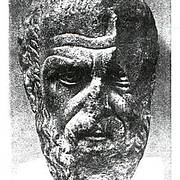Arrian
Author of The Campaigns of Alexander
About the Author
Historian, philosopher, and general, Arrian was born into a wealthy Greek family in Nicomedia, in Asia Minor. He was a pupil and friend of the philosopher Epictetus, whose lectures he published at Athens. For six years, from 131 to 137, he served as governor of Cappadocia under the emperor Hadrian. show more It was during this time that he successfully drove back invading Alans. Arrian wrote several geographical and historical works, including the Indica, an account of a voyage to India. He is best known, however, as author of the Anabasis. A much praised and valuable account of the life of Alexander the Great, it is based on the writings of Ptolemy I and Aristobulus, two of Alexander's generals. He modeled the work on Anabasis of Xenophon. Arrian died at an advanced age during the reign of Marcus Aurelius. (Bowker Author Biography) show less
Works by Arrian
Arrian: Anabasis of Alexander, Books 5-7. Indica. (Loeb Classical Library No. 269) (1707) 117 copies
Alexander The Great: Selections From Arrian, Diodorus, Plutarch, And Quintus Curtius (2005) 69 copies
Arrian: Alexander the Great: Selections from Arrian (Translations from Greek and Roman Authors) (1981) 37 copies
Arriani Nicomediensis Scripta Minora 13 copies
Tactical Handbook and the Expedition Against the Alans/Texnh Taktika: A Manual for Ancient Warfare (1993) 8 copies
Ancient India As Described by Megasthenes and Arrian, a Tr. of the Fragments of the Indika of Megasthenes Collected by… (2010) 7 copies
Anabasis Alexandri: Books I-IV (History of Alexander and Indica - Loeb Classical Library, Vol. I) (1929) 5 copies
De expeditione Alexandri Magni 2 copies
History of Alexander and Indica I 2 copies
Le manuel d'Épitecte 1 copy
Alexanders des Großen Siegeszug durch Asien. Eingeleitet u. neu übertr. v. Wilhelm Capelle (1950) 1 copy
Histoire d'Alexandre.. 1 copy
Guerre du Péloponèse suivi de Retraite des Dix Mille, La Cyropédie, Du commandement de la cavalerie, Traité… — Author — 1 copy
Les entretiens d'Épitecte 1 copy
The Anabasis of Alexander; or, The History of the Wars and Conquests of Alexander the Great (0002) 1 copy
Storia di Alessandro 1 copy
Acies Contra Alanos (Greek) 1 copy
Anabasis, books 1 & II 1 copy
Flavius Arrianus. Adiectae sunt tres tabulae geographicae et fragmentum papyri 1284 societatis italianae / Vol. II,… (2013) 1 copy
Tactica (Greek) 1 copy
Obras completas 1 copy
Cynegeticus (Greek) 1 copy
Associated Works
Tagged
Common Knowledge
- Canonical name
- Arrian
- Legal name
- Arrianus, Lucius Flavius
- Other names
- Arrian
Arrian of Nicomedia
Arrianus Xenophon, Lucius Flavius - Birthdate
- c. 86
- Date of death
- c. 146
- Gender
- male
- Nationality
- Greece
- Country (for map)
- Greece
- Birthplace
- Nicomedia, Bithynia
- Place of death
- Athens, Greece
- Places of residence
- Nicomedia, Bithynia
Nicopolis, Epirus
Cappadocia
Athens, Greece - Occupations
- Consul
Procurator (province of Cappadocia)
Archon (at Athens)
Author - Relationships
- Epictetus (teacher)
- Short biography
- Arrian was born in the town of Nicomedia, in the province of Bithynia (present-day Izmit, Turkey), and studied philosophy under Epictetus in Nicopolis. He entered service in the Roman Empire, serving under Gaius Avidius Nigrinus, governor of Achaea, and eventually achieving the office of Consul in 129 or 130. In 131 he was appointed procurator of Cappadocia, and in 135 he commanded the legions that repelled an Alan invasion. He was elected Archon at Athens in 145/6, where he later devoted himself to history, writing the "Anabasis Alexandri" and the "Indica."
Members
Reviews
Lists
Awards
You May Also Like
Associated Authors
Statistics
- Works
- 79
- Also by
- 2
- Members
- 2,484
- Popularity
- #10,327
- Rating
- 4.0
- Reviews
- 32
- ISBNs
- 87
- Languages
- 14
- Favorited
- 2















Campbell introduces, edits, translates, and comments the text - the commentary accounts for well over half the page count. Much of it consists of disagreements with previous translators, but the is also in-depth discussion of all the units of the Roman army involved, and elucidation of obscure passages.
A must for those interested in ancient military texts.
* A nomadic people of the Caucasus region. The modern Ossetes are their descendants.… (more)